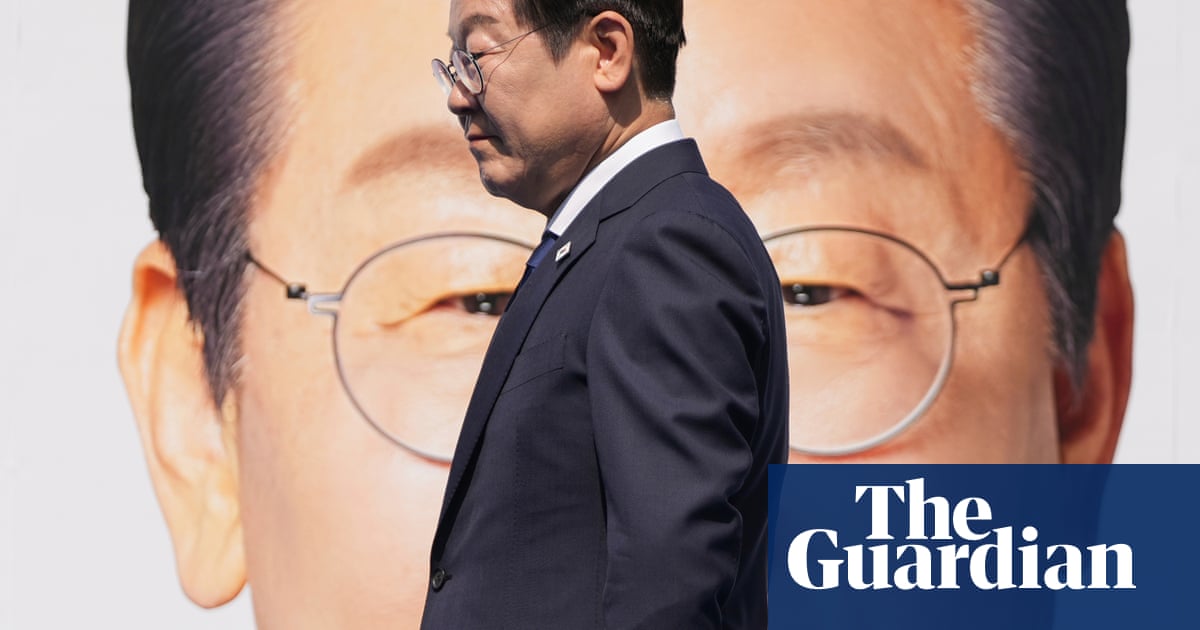After theunprecedented turmoilof the past six months, South Koreans could be forgiven for breathing a collective sigh of relief that the political focus has shifted from an impeachment crisis to economic policy ahead of next month’s presidential election.
The economy is expected to dominate the campaign to elect a new president on 3 June, after the impeachment ofYoon Suk Yeol, whosedeclaration of martial lawin December triggered the South’s most serious political crisis for decades.
Asia’s fourth-biggest economy – one of the region’s big success stories of recent decades – is reeling from low growth, a super-ageing society, one of theworld’s lowest birthratesand the fallout from Donald Trump’s tariff wars.
The Yoon debacle cast a long shadow over the campaign when it kicked off this week. The former president, who was ousted after the constitutional courtupheld his impeachmentlast month, made his third appearance in court in a separate criminal trial while senior figures in his conservative People Power party (PPP) clashed over who should run in the election to succeed him.
After days of public infighting, the party announced that the former labour minister and hardline conservativeKim Moon-soo, would run. He will be up against Lee Jae-myung, the liberal Democratic party candidate, who leads comfortably in the polls.
Lee, whonarrowly lostto Yoon in 2022 after a divisive campaign, thanked his supporters for helping him rebuild after the “painful defeat” three years ago. “I promise to repay their support with victory,” he told a crowd in Seoul.
Kim will be hoping to banish memories of Yoon’s botched suspension of civilian rule and prioritise his plans for the economy amid record-high youth unemployment, and a housing and cost-of-living crisis.
“I genuinely believe I must become a president for the people, a president for livelihoods, a president for the economy,” Kim told reporters after launching his campaign at a market in the capital. “I must be a president who ensures the people ofSouth Korealive well.”
Lee, meanwhile, is contesting criminal charges that have threatened to disqualify him from the race. His ongoing trials range from alleged bribery to charges mostly linked to a $1bn property development scandal. He has, though, been given breathing room after courts agreed to push back further hearings until after the election. He denies all charges.
Kim’s chaotic selection underlined the size of the challenge facing the PPP since Yoon, a conservative populist, attempted to impose martial law to confront what he described as “pro-North Korean” elements in the Democrat-controlled national assembly.
Yoon, who was impeached by the assembly two weeks later, was succeeded by two acting presidents while the constitutional court considered his fate. He is on trial on charges ofinsurrection– a crime that carries life in prison or the death penalty, although South Korea has not carried out an execution since 1997. Yoon has denied the charges.
Kim was initially selected to run for president in early May, only for his candidacy to be cancelled as senior party figures attempted to replace him with the former prime minister, Han Duck-soo, whom they said had a better chance of defeating the resurgent Lee.
Party members voted down the attempted coup and Kim was reinstated, amid warnings that infighting would hand Lee an easy victory.
Even PPP supporters said they were dismayed by the party’s preparations for the election. “The PPP is just a mess. They are self-destructing,” said Lee Jung-ja, a 52-year-old voter. “Even if they unite, it still won’t be enough. All they’re doing is fighting with each other. I bet Lee Jae-myung is gloating.”
If elected, Kim said he would demand an immediate summit with Donald Trump to negotiate tariffs and take a hard line against nuclear-armedNorth Korea. He has promised to create a more business-friendly environment to encourage private investment and to increase housing support for young people and newly married couples.
Lee has campaigned in a bulletproof vest following claims by Democratic party lawmakers that they had received text messages warning of an assassinate plot. They claimed he was being targeted by former operatives from a covert South Korean military unit that operated when the country was ruled by authoritarian regimes from the 1960s to the 1980s.
Lee, who wasstabbed in the neckduring a press conference in January 2024, referred to the unusual precaution, telling supporters that South Korean society was “now so fractured that a presidential candidate must campaign in a bulletproof vest”.
Lee has said he will boost economic growth through AI and theKorean culture wave– a major driver of exports and inbound tourism – and offer tax incentives to encourage couples tohave more children.
Like previous liberal candidates, he has vowed to restart a dialogue with North Korea, despite the regime’s development of nuclear weapons andmilitary alliance with Russia.
In an editorial, the Korea Herald noted that Yoon’s impeachment had left little time for debate and urged South Koreans to “resist partisan reflexes”.
The newspaper said: “The next president will inherit more than a fractured government. They will inherit the responsibility to restore institutional trust, re-anchor the economy and navigate an increasingly volatile global order. The task ahead is formidable.”
With less than three weeks until the election, one poll gave Lee a lead over Kim of 43% to 29%, while another put Lee on 49.5% and Kim on 38.2%
